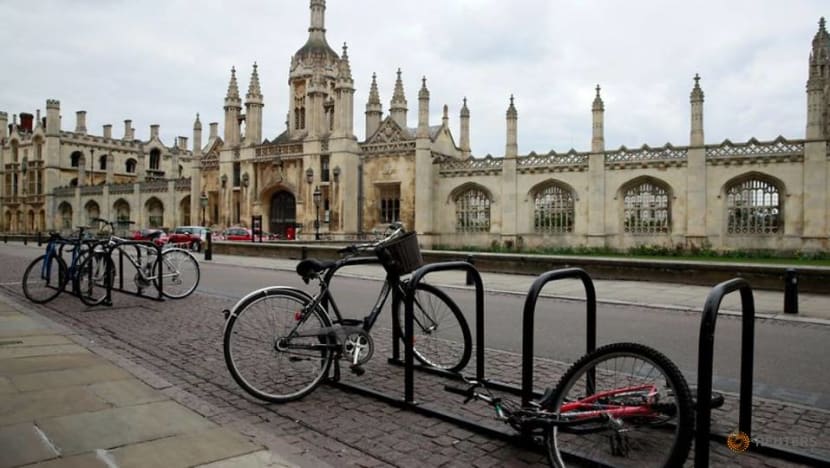COVID-19: Singaporeans enrolled in overseas universities unsure about future studies

Bikes are seen outside Cambridge University, as the spread of COVID-19 continues. (FILE PHOTO: REUTERS/Andrew Couldridge)
SINGAPORE: Student Carolyn Tan was on the bus to the airport to board a plane back to Singapore when she received an email from her university informing students that it would be closing all its facilities and moving classes online in response to the COVID-19 pandemic.
Ms Tan, who is in her second year studying for an Economics degree at Cambridge University, told CNA she was relieved at the time that she had already booked her plane ticket before receiving the news, avoiding the scramble for flights home.
“Deep down you hold on to that little hope that maybe things will get better and they’ll still ask us to go back for the third term as usual. But I think by that point, that hope was very, very small.
“When that email came, it was more of a relief that okay, I know that I've made the right choice to go back home and that it was a wise decision to make my plans before they sent the email.”
On May 20, Cambridge University announced that all its lectures would be delivered online over the next academic year, until summer 2021, because of the COVID-19 outbreak.
The university, in a notice posted on its website dated May 22, later clarified that while online lectures will make a "key contribution", it is "determined" to "bring the Colleges and the University back to life" with "intensive in-person learning in the traditional locations".
The university had shut its campuses to students in March after the British government introduced a strict lockdown to curb the spread of COVID-19.
READ: Commentary: The coronavirus is sending universities back to school
The 21-year-old landed in Singapore on March 19, just days after the Singapore government announced that all travellers from the UK, Switzerland, Japan and ASEAN countries would be subject to a 14-day stay-home notice (SHN).
"From what I've heard, they're not planning to cut fees, which is definitely something that students aren't very happy about," said Ms Tan.
"But I understand that there's quite a lot of layers of decision making, that we can't even just appeal to our own university about these because they take the cue from the education ministry in the UK."
She pays about £10,000 (S$17,500) per term for her degree at Cambridge University, inclusive of £1,600 for rent.
The university has waived rent for students who may have gone home and no longer live on campus, she added.
For students like Ms Tan who pay thousands of dollars to study for a degree at an overseas university, handing over full school fees for remote classes and lectures can be a sore subject. The students CNA spoke to said that while the situation is not ideal, they also recognise that these are extraordinary times.
For Ms Germaine See, who is currently in the third term of her second year at Durham University in the UK, her university did not offer any refund of school fees for foreign students who returned home. The 21-year-old returned to Singapore at the start of the Easter holidays on Mar 24.
Most of the teaching has been halted and revision lectures have been occasionally posted online on the school portal, to support students studying for the upcoming exams, she added. A 48-hour window for examinations was implemented to accommodate students who may be overseas and in different timezones.
Her studies at Durham University cost £18,000 per year. When asked about having to take remote classes while paying full school fees, she said: “At the start when I first came back to Singapore, it was a sense of relief, that I was back home and I was safe from everything.
“But slowly the disappointment did sink in after a while, especially during the SHN for 14 days,” she said, adding that she had envisioned her second year in university to be "a certain way" and having part of that experience taken away was “quite a big hit”.
“Granted, I do feel that is quite a waste to spend (the money) because my fees are £18,000 per year. That will translate to about £6,000 per term. So I couldn’t justify to myself why I was paying about six grand to do an online course in Singapore without the university experience.”
READ: Pandemic could cost Australian universities $11 billion: Lobby group
With her third year ahead of her, Ms See has also already signed the lease for her accommodation in the next school year and paid the sum in full.
“Should we be unable to return to school, my main concern would really be my accommodation plans and belongings. Should I not be able to go back to the UK, I am unsure of how to go about negotiating the lease and whether or not a refund would be possible,” she said.
Most of her belongings are still in her old apartment, and that lease ends in September, she said. If she is unable to head back to the UK by then, her belongings will likely be disposed of, or shipped back at additional cost.
Another one of her concerns about returning home was her final examinations this year.
“Given that I am in Singapore, I was worried that the time difference between Singapore and the UK would affect my ability to perform,” she told CNA.
“The lack of communication from the school coupled with the fact that I was bound (by a) stay-home notice for 14 days didn’t really help with the stress and anxiety of this period.”
As for Ms Ho Kah Yoke, who has just completed her first year studying for a Masters’ degree in public administration at New York University, paying a significant sum for remote learning was “a complicated feeling”.
“Of course, I don't want to pay such a rate for just remote learning but at the same time, I was one of the very few, I think there were only a handful of international students from my course and my school who decided to fly back home.
“Being such a small, tiny minority, I felt like this was my choice that I made. So I just have to live with the consequences of paying this exorbitant fee for online learning, while the rest of my classmates were still in New York. They have the option to continue face-to-face (classes) in the next semester.”
The 32-year-old returned in mid-March, just as the number of COVID-19 cases spiked in New York.
READ: Fears of second US COVID-19 wave rise on worrisome spike in cases, hospitalisations
Some students at her university even started a petition to the school to request for a refund of school fees. Adding that no one knows how the situation in New York will change in the coming weeks, she said: “I feel like I’m very unhappy about this, but I made this choice.”
Ms Ho is also still paying US$1,250 per month for the lease on her apartment. Since the lease has been signed until July, she and her roommate tried asking her landlord for a rent reduction, but her request was turned down.
"It's been sitting empty. My roommate has put up the listing but of course, nobody has taken it up."
However, some students have chosen not to come back to Singapore amid COVID-19 travel restrictions, citing school and work commitments, and having already made the necessary preparations for their stay overseas.
Mr Hillary Tan’s mother was very worried about his decision to remain in the US and had asked him to return home, leading to several heated arguments.
“In the end, they gave me a list of precautions to take and ordered some masks and had them shipped to my apartment. I'm still using that stash,” said the 26-year-old, who is a graduate student at the University of Missouri.
His university closed in March, with classes and coursework moving fully online.
“It was a bit of a struggle to find the motivation to do a lot of it. But I finally had more time to cook my own meals and save more money, so that was fun.”
Mr Tan, who is pursuing a Masters of Arts in Journalism, is supposed to graduate at the end of this year, and is waiting to see if he can complete his Masters’ project as scheduled.
“If I get an early confirmation that my photo project is impossible to do, it's not a sure thing that I'll come back, but it'll push me in that direction more,” he said.
Ms Jess Ng, 25, flew to Seoul to study Korean Language at the Yonsei University Korean Language Institute at the end of February, just as South Korea saw a rapid surge in the number of COVID-19 cases after a cluster of infections emerged from a religious sect in Daegu.
“Studying a language is mostly for self-development, so I thought the sooner I finished it the better. Plus there was no guarantee when COVID-19 would die down, so I didn’t feel that there was a need to delay it at that time,” she told CNA.
While she “can’t say they weren’t worried”, her parents were “quite supportive” of her decision, especially since the preparations were already complete, including her travel visa and accommodation. She had already finished applying to the school and paying the necessary fees by December.
“All the preparations were done and I wasn’t sure when would be the next best time to go ahead with it, so I just went ahead. I think it’s been pretty good here so far, I just need to constantly keep a lookout for the health advisories,” said Ms Ng, adding that she was subject to a 14-day quarantine in a single room in the school dormitory after arriving in Seoul.
THE FUTURE OF UNIVERSITY LIFE
For students like Ms Tan, Ms Ho and Ms See who have returned home in the middle of their studies, many are uncertain about the future of their courses amid widespread COVID-19 travel restrictions.
Even if she can return for her third year at Cambridge, student activities on campus are likely to face the same restrictions as lectures, said Ms Tan.
“For some of us, what we’re thinking of are the implications (the announcement) has for other activities that contribute to university life,” she said, adding that student society meetings and church services that see the same kind of attendance as lectures were likely to be affected.
“Them making the announcement sort of solidifies all the fears that we had about next year not being back to normal which, I guess we should have already known. But it just makes it more of a reality.”
Adding that her studies will be “very dependent” on the situation in the UK in a few months, Ms Tan said there were several considerations - whether travel restrictions would be lifted, and whether it would be safe to return to the UK.
“And the other side is, if things are really going to be so disrupted, do we want to go back?” she added.
Some of her friends have jokingly discussed taking a gap year because they feel they would miss out on university life if they return to the UK to complete their studies amid COVID-19 social distancing measures.
“Even though they can do teaching pretty decently through virtual platforms, I think a lot of us feel that university life is so much more than that, and we just really want to treasure the time that we have there. Especially because it's overseas, you know, it's kind of this once in a lifetime opportunity.”
Ms See said while there is “an optimism” that she and her friends will be able to head back to Durham for the next semester, they are unsure about how different classes and teaching will be.
“While virtual teaching may be viable in the short run, I genuinely feel that it is not as effective as teaching in real life and am worried how this mode of teaching would impact my learning, especially now that I’m in my final year and am required to write a dissertation,” she said.
Adding that university is “more than just getting good grades”, but also about “forming deep bonds and memories” with her friends, she said: “Should I be unable to go back to the UK, I will be missing out on the social aspect of university. One that cannot be easily replaced nor recreated in this lifetime.”












